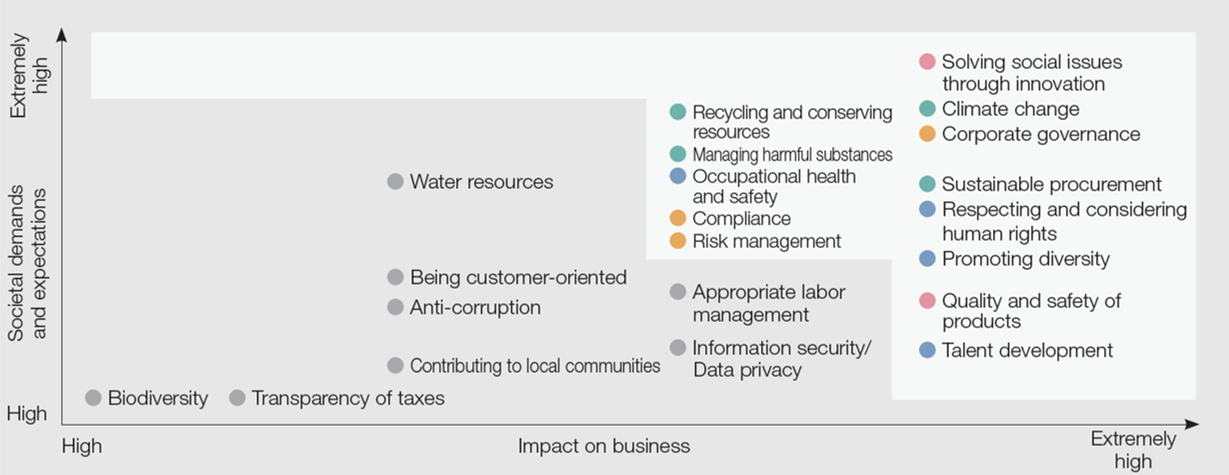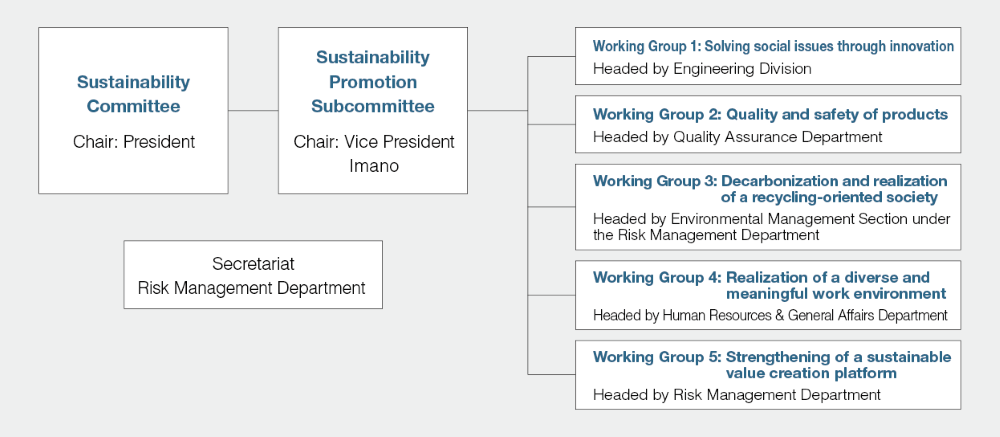Material Issues and KPIs
Committed to Sustainability Initiatives in Development, Design, Production, and Sales
As part of strengthening the sustainability management of the THK Group, an interdepartmental project to review material issues in light of the most recent state of society and changes to THK’s internal environment was launched in 2021. Specifically, project members deliberated together about the social issues that surround the THK Group, evaluating and examining these issues based on two axes: impact on business (horizontal axis) and societal demands and expectations (vertical axis). The result was graphed into a matrix, and 13 topics under four themes received final approval by the Board of Directors.
Defining Material Issues

Matrix

Themes and Topics Related to Material Issues

Metrics and Targets
Five working groups were established for the defined themes to pursue concrete initiatives for the material issues. After several rounds of deliberation among these working groups, the official metrics and targets were decided at a Sustainability Committee meeting held in October 2023. The entire THK Group will pursue activities aimed at the achievement of these metrics and targets.
Organization Structure



| Theme | Topic | Head department | Metric and target | Scope | Target year | 2024 results |
|---|---|---|---|---|---|---|
| Creating an affluent society and solving social issues through innovation | Solving social issues through innovation | Engineering Division | Develop and provide new products and services (including DX and other solutions) for aerospace, automotive, logistics, medical, and other consumer fields | THK Japan, Group companies in Japan, Group companies outside of Japan |
2026 |
|
| Quality and safety of products | Quality Assurance Department | Promote the appropriate operation of quality management systems, including ISO 9001 and IATF 16949, and the maintenance of certifications at relevant locations | THK Japan | 2026 |
|
|
| Decarbonization and realization of a recycling-oriented society | Climate change | Risk Management Department | Reduce Scope 1 and 2 CO2 emissions to 50% of 2018 levels (2018 emissions: 106,514 tons, 2030 target: 53,257 tons) | THK Japan, Group companies in Japan |
2030 |
|
| Sustainable procurement | Risk Management Department | Distribute sustainable procurement guidelines to suppliers and conduct interviews and surveys through questionnaires | THK Japan | 2026 |
|
|
| Recycling and conserving resources | Risk Management Department | Maintain zero emissions1 | THK Japan, Group companies in Japan (Production Division) |
2026 |
|
|
| Managing harmful substances | Risk Management Department | Distribute green procurement guidelines and obtain certificates of non-use | THK Japan, Group companies in Japan, Group companies outside of Japan |
2026 |
|
|
| Realization of a diverse and meaningful work environment | Respecting and considering human rights | Human Resources & General Affairs Department | Achieve a 100% completion rate for online human rights training | THK Japan | 2026 |
|
| Promoting diversity | Human Resources & General Affairs Department | Achieve a ratio where women constitute 20% or more of new hires in the sales, administrative, and engineering divisions | THK Japan | 2026 |
|
|
| Occupational health and safety | Human Resources & General Affairs Department | Achieve and maintain a severity rate of 0.01 or less and an incident rate of 0.50 or less | THK Japan (Production Division) | 2026 |
|
|
| Talent development | Human Resources & General Affairs Department | Maintain a 95% or higher completion rate for basic data utilization training | THK Japan | 2026 |
|
|
| Strengthening of a sustainable value creation platform | Corporate governance | Risk Management Department | Continue conducting annual evaluations of the effectiveness of the Board of Directors | THK Japan | 2026 |
|
| Compliance | Risk Management Department | Strengthen the diversity of internal reporting contacts and investigators | THK Japan | 2026 |
|
|
| Risk management | Risk Management Department | Continue conducting annual risk assessments | THK Japan, Group companies in Japan, Group companies outside of Japan |
2026 |
|
1 Zero emissions: An emissions rate (volume of waste disposed/total discharged) of less than 0.50%.
2 Severity rate: The number of lost workdays multiplied by 1,000 and divided by the total number of hours worked. Incident rate: The number of deaths or injuries multiplied by 1,000,000 and divided by the total number of hours worked.
 solutions and engaged in activities to expand
solutions and engaged in activities to expand